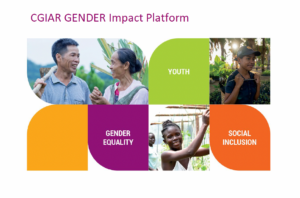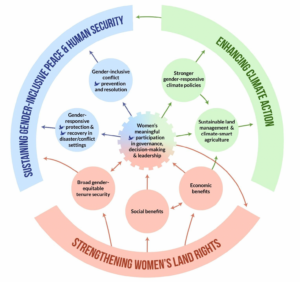The focus of this scoping review is to understand the extent gender-disaggregated data are available in climate-smart agriculture (CSA) programming, identify gaps in the collection and analysis of this data, and suggest ways to bridge those gaps to reduce gender inequalities that may prevent women and girls from benefiting from CSA programming. The methodology involves a qualitative approach that uses a desk review of selected literature and key informant interviews.
The CSA framework has three primary objectives: production, resilience and mitigation. Gender equality, social inclusion and other equity-oriented objectives are not included in these three objectives. Gender was retrospectively included as something that should be “mainstreamed” in the pursuit of the three primary objectives. The Food and Agriculture Organization’s (FAO) seminal paper on CSA in 2010 did not address gender, gender equality or equity. As a result, there are no tools, methods or metrics that address gender equality in the paper. The weakness of the CSA framework has become more apparent over time, and the discourse and practice on gender in agriculture has progressed from sensitivity and mainstreaming toward responsiveness and eventually transformation. However, there has been no commitment to specific actions and measurement systems that would track progress, illustrating the lack of expectation and ambition for advancing gender equality within CSA.
Authors: Peter Wright, Karl Deering, Abinet Tasew, Emma Smith, Maureen Miruka, Pranati Mohanraj, Henry Swira
Source: CGIAR GENDER Impact Platform · Working Paper #021
Citation: Wright, Peter, Karl Deering, Abinet Tasew, Emma Smith, Maureen Miruka, Pranati Mohanraj and Henry Swira. 2024. Scoping review on gender-disaggregated data in climate-smart agriculture. CGIAR GENDER Impact Platform Working Paper #021. Nairobi, Kenya: CGIAR GENDER Impact Platform.




